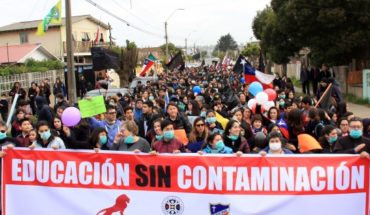Chile’s legal team defended the strength of Australia’s request to extradite Adriana Rivas, a former agent of Augusto Pinochet’s regime and accused of the disappearance of seven people in the 1970s, during an appeal hearing that was heard for sentencing on Thursday.
In a virtual hearing, the Federal Court of Australia addressed the appeal of Rivas’ defense to his extradition approved on October 29, 2020 by a local court in Sydney and ratified on June 24 by the same Federal Court.
The lawyer representing the Chilean authorities, Trent Glover, said that previous sentences have already established the reasons for extraditing Rivas for the alleged crimes of “aggravated kidnapping” of Víctor Díaz, former undersecretary of the Communist Party of Chile, in 1976, and six other activists, including a pregnant woman.
It is presumed that the 68-year-old Chilean, who has been held in a Sydney prison since her arrest in February 2019, was part of the Lautaro extermination brigade of the DINA (Pinochet’s secret police), where she became the secretary of Manuel Contreras, the head of this unit.
Glover criticized the arguments of Rivas’ lawyer, Frank Santisi, which were based on the Amnesty Law in Chile, which protects the authors, accomplices or cover-ups of crimes perpetrated during the Pinochet dictatorship from his coup d’état, on September 11, 1973, until March 10, 1978.
Counsel said that the interpretation of Pinochet’s decree does not apply to crimes against humanity and, therefore, to those of aggravated kidnappings.
He also recalled that “aggravated kidnapping existed at the time of the alleged criminal conduct attributed to Rivas” and that, under Australian law, there does not have to be a “total correspondence” of the typification of the crimes for extradition to proceed.
Two of the three magistrates were particularly incisive with the arguments of Rivas’ defense, considering that they led them to a “complete dead end” and that they question the “central” principles of the extradition law.
“The (Australian) court only has to determine if the material presented complies with the extradition law,” Adriana Navarro, a lawyer for the relatives of the seven victims attributed to Rivas, told EFE.
Rivas can still appeal his extradition to the High Court of Australia, but in this instance he can only allege alleged procedural errors.
If the courts uphold his extradition, the final decision will fall to the Australian Attorney General, Michaelia Cash.
Rivas traveled in 1978 with her then-husband to Australia, where she dedicated herself to cleaning and childcare, and after returning to Chile in 2006 she was arrested for the cases related to her extradition, although she later managed to escape and return three years later to Sydney.
Chile defended the extradition request of Adriana Rivas, secretary of Manuel Contreras: defense of the former DINA agent invoked Amnesty Law
November 18, 2021 |





